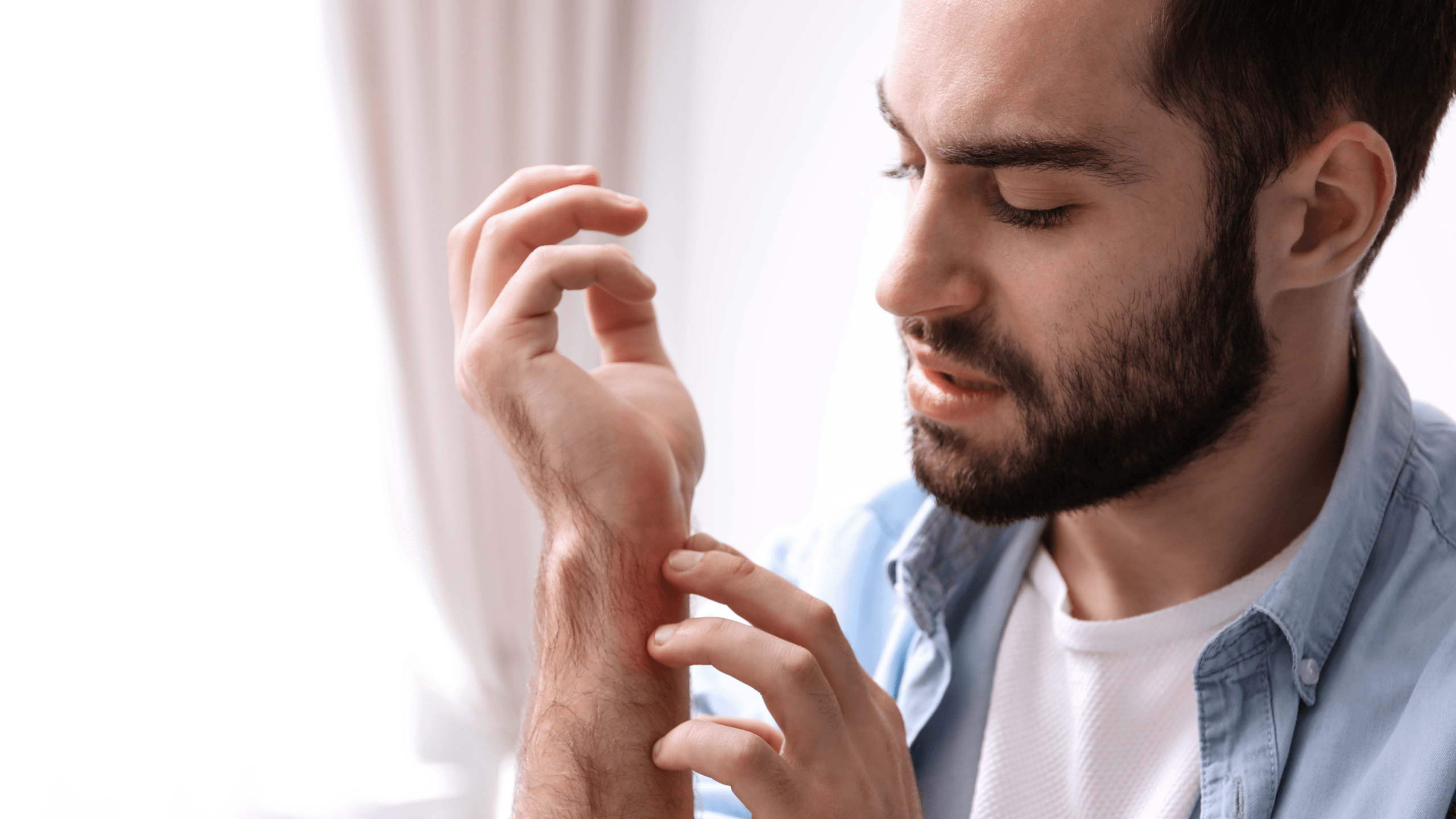Adult-onset eczema is a diagnosis given to people who develop eczema for the first time after turning 18. Adult-onset eczema can involve any of the different types of eczema, including its most common form, atopic dermatitis (AD).
If you had eczema during childhood that subsided but then resurfaced in your adulthood, or if you’ve been dealing with eczema your entire life, you may not receive a diagnosis of adult eczema, even if your “adult eczema” is different from eczema you experienced previously.
Why all the fuss about developing eczema during adulthood? Eczema typically develops in young children. According to the National Eczema Association, eczema’s prevalence tends to peak in early childhood. Eczema that either develops during, resurfaces in, or persists into adulthood is believed to be less common than childhood-onset eczema.
Even so, adults who develop eczema are far from alone, with 1 in 4 adults reporting adult-onset of AD. If you are one of the many adults who is experiencing eczema for the first time (or for the first time in many years), here’s what you need to know.
Can You Develop Eczema as an Adult?
Yes, you can develop eczema as an adult — without any warning signs or a past history of the condition. While some people may develop atopic dermatitis for the first time as an adult, others will experience adult eczema after previously dealing with it as a child. When eczema returns in this way, it’s often milder the second time.
What Triggers Eczema in Adults?
The exact cause of eczema, regardless of when it develops, remains unknown today. However, researchers and doctors believe eczema is influenced by a combination of genetic, environmental, and bacterial factors. There is also a wide variety of known eczema triggers that can contribute to adult-onset and child-onset eczema alike.
That said, some age-related factors can come into play when it comes to developing and/or experiencing eczema as an adult.
Skin dryness + eye eczema
As you age, your skin tends to dry. Since dry skin is a known trigger and symptom of eczema, age-related dryness makes your skin more susceptible to developing eczema. Adult eczema tends be be dry and scaly, and it's also more common for adults to develop eczema around the eyes.
This is especially relevant for skin around the eyes as it’s particularly thin and sensitive; adults with eczema will often see thickened, darkened eye skin, which you don’t typically see in children with eczema.
Stress and hormonal changes
Stress can occur at any age, but adulthood can come with particular stressors. Stress releases the hormones adrenaline and cortisol, which can suppress the immune system and set off an inflammatory response throughout your body that can trigger eczema.
Your body also continues to experience hormonal changes into adulthood that can trigger eczema. For example, women can also experience sudden adult eczema symptoms as a result of pregnancy- and postpartum-related hormonal changes.
Varicose eczema and asteatotic eczema
Two types of eczema are more common in older adults. Varicose eczema occurs when the skin on the lower legs becomes fragile and susceptible to ulceration. It is common in people who have deep vein thrombosis. Asteatotic eczema (also called eczema craquelé) typically occurs in geriatric populations who live in cold, dry climates.
Eczema in Children vs. Eczema in Adults
In a lot of ways, eczema shows up very similarly in both adults and children. However, there are some key differences between how a child may experience atopic dermatitis versus how an adult may experience the same condition.
Similarities
Atopic dermatitis in both children and adults:
- Can be very itchy, to the point of losing sleep
- Can show up anywhere on the skin
- Impacts mental health and quality of life
- Greatly increases risk of skin infections
- Makes it more likely you may also have asthma, hay fever, and other allergies (also known as the atopic triad)
Differences
While many of the psychological and physiological effects of eczema are the same in children and adults, adult on-set eczema can have different physical characteristics from child-onset eczema.
In adults, atopic dermatitis tends to be more scaly and dry than it is in children. This is likely due to the fact that adults have naturally drier skin than children, which can exacerbate eczema symptoms.
Managing Adult-Onset Eczema
While eczema is most common in children, many adults have atopic dermatitis and other forms of eczema.
If you’ve just started experiencing eczema symptoms for the first time in your 20s, 30s, 40s, 50s, or beyond, be sure to consult with a board-certified dermatologist to receive an accurate diagnosis and establish a treatment plan.
Should you have already received a diagnosis of adult-onset eczema, you may find these additional resources helpful:
- How Long Does Eczema Last?
- Is Eczema a Disability?
- Living with Adult-Onset Eczema: Ashley Berlot’s SKIN Journey
Incorporate Gladskin Into Your Routine
Your dermatologist or doctor may recommend that you try an over-the-counter eczema cream. If that’s the case, consider Gladskin’s Eczema Cream with Micreobalance®, which is clinically proven to reduce eczema symptoms and works with your skin to rebalance its microbiome.
And if your dermatologist tells you that the products you’re currently using are making your skin worse, you can swap them out for our fragrance-free body lotion, body wash, face wash, shampoo bar, and makeup remover, which are all minimally formulated and microbiome friendly.
Living with eczema at any age is tough. Gladskin is here to make it a little easier.
